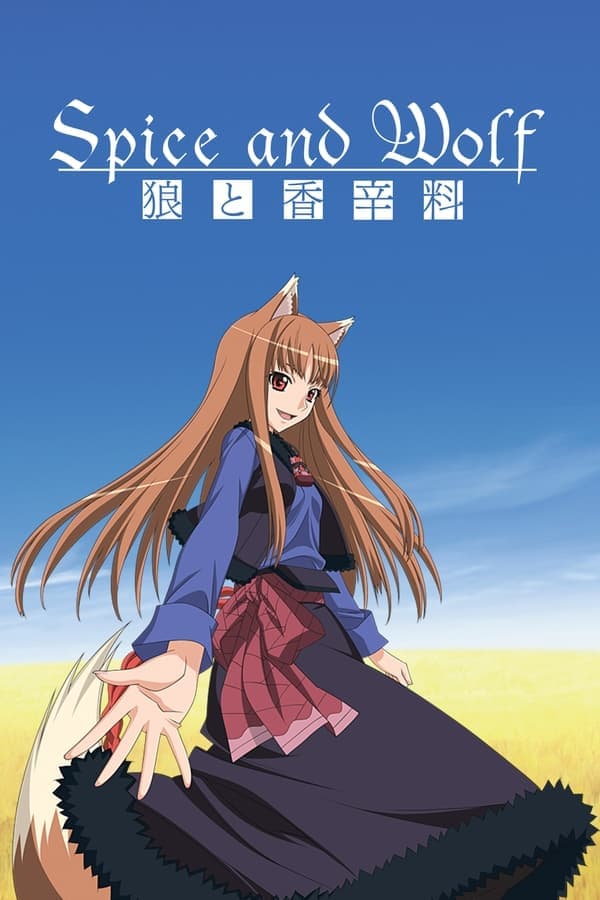
Spice and Wolf
2008 • Action & Adventure, Animation, Drama, Sci-Fi & Fantasy • TV-14
Lawrence, a traveling merchant searching for profit, finds a naked girl with the ears and tail of a wolf asleep in his cart. Her name is Holo – a harvest goddess with an untamed beast lurking inside who longs to return to her beloved northern home. Armed with his street smarts and her animal instincts, a simple peddler and a forgotten deity begin a journey through the wild countryside. Along their path, the riches of happiness shall be reaped, even as the bankruptcy which dwells in the human heart is exposed.
Why you should read the novel
If you seek a more immersive journey into the enchanting world of 'Spice and Wolf,' you'll discover that the original light novels provide a much richer and deeper exploration than the TV series. The books by Isuna Hasekura delve extensively into the complex economic plots and the charming relationship between Kraft Lawrence and Holo, allowing for more nuanced character development and intellectual satisfaction. Reading the novels also gives you access to internal dialogue and world-building that far exceed what can be conveyed on screen.
With books, you can fully appreciate Isuna Hasekura's masterful narrative style and enjoy the subtleties of Holo's wit and her interactions with Lawrence. The source material paints a vivid picture of their journey through meticulously described towns, markets, and landscapes rarely seen in such detail on television. Readers can pause to savor thoughtful exchanges and unravel the clever economic strategies at their own pace.
Moreover, the books unfold at a more deliberate tempo, granting you deeper insight into characters' emotions, motivations, and growth. The experience truly invites you to become a fellow traveler alongside Holo and Lawrence, making their journey uniquely personal and rewarding. For fans of intricate world-building, clever dialog, and heartfelt storytelling, the novels offer a rewarding adventure that goes beyond any adaptation.
Adaptation differences
One of the most significant differences between the 'Spice and Wolf' TV adaptation and the novels lies in the depth of the economic discussions. The anime often simplifies or glosses over complex details surrounding trade, currency speculation, and merchant strategies in order to maintain pacing and accessibility for a wider audience. In the books, however, Isuna Hasekura delves much deeper, presenting nuanced explanations and engaging the reader's intellect as both Lawrence and Holo navigate the intricacies of medieval commerce.
Character development is another area where the two versions diverge. The novels provide access to extensive inner monologues and subtle emotional shifts, particularly from Lawrence's perspective. These internal thoughts reveal doubts, aspirations, and small moments of growth that the anime rarely explores due to time constraints. As a result, readers will notice much richer, more gradual character arcs unfolding in the source material.
Pacing also differs markedly between the two formats. The anime tends to condense certain events, combine or omit minor characters, and reorder sequences to fit limited episode counts. This sometimes leads to a loss of detailed world-building and downplays the cultural and historical nuances present in the novels. The light novels, in contrast, take their time to explore each new town, custom, and scenario in greater detail, creating a more immersive and believable world.
Finally, specific plotlines and conversations are altered or left out entirely in the adaptation. Some business ventures or relationship moments introduced in the books are simplified or excluded for brevity, which can change the emotional weight of certain scenes or even shift the perceived chemistry between Holo and Lawrence. Dedicated fans will notice how some of the clever banter, subtle foreshadowing, and intricate plot resolutions present in the books are either abbreviated or omitted in the anime, making the novels a more comprehensive and rewarding experience.
Spice and Wolf inspired from
Spice and Wolf
by Isuna Hasekura